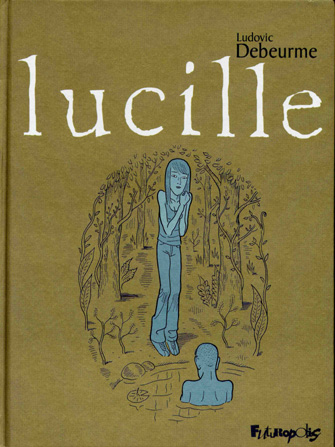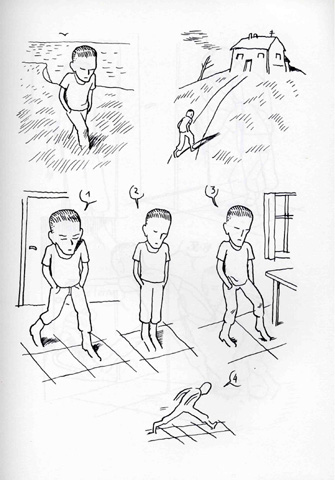 Home > Bart Beaty's Conversational Euro-Comics
Home > Bart Beaty's Conversational Euro-Comics Lucille, Ludovic Debeurme
posted November 22, 2006
Lucille, Ludovic Debeurme
posted November 22, 2006


The
announcement yesterday of the nominees for the Grand Prix de la Critique seemed like a good incentive to take a look at the choices made by
Association des Critiques et Journalistes de la bande dessinee. Alas, I only own two of the five nominees, and since
Futuropolis (who scored three nominations),
Delcourt and
Dupuis (who scored the other two) have left me off their press list, I'm not likely to even browse the other three until at least
Angouleme. So my overview of the nominations will be half-assed, or, more precisely, forty per cent assed.
So here's the first twenty per cent.
Lucille, by
Ludovic Debeurme, is one of those brick-sized tomes (like the
Blankets hardcover) that I tend to buy in France and which then make me worry about exceeding my baggage weight restrictions for the flight home. It's a great big, thick book of several hundred unnumbered pages. I was set to devour it nine months ago, but in flipping through it I realized that, as big as it is, it was only the first volume of an ongoing story, so I moved it down the to-read list, only to have the ACBD bring it back up for me.

I've been a fan of Debeurme's since he published his first works with
Cornelius (
Cefalus (2002) and
Ludologie (2003)) several years ago. Since that time he has stripped down what was already a rather spare visual style. Indeed, the art in
Lucille, with its thin lines and lack of details, comes across as something from the
John Porcellino,
Anders Nilsen or early-
Chester Brown era of American independent comics (there's also some
Carol Swain in the framing, though not in the detail work). There is a casualness to the visual presentation, a facet that is highlighted by the lack of panel borders, that does not always work. For instance, in a climactic fight scene in a bar the sketchiness serves to confuse the action, making it difficult to follow the sequence of events, thus undermining a major plot development. At times the book reads as if it is notes for another book.
On the other hand, it is generally only a few pages later that Debeurme's minimalism is put to superlative use (as in a swimming scene). I found myself constantly switching gears from "This style doesn't work here" to "This style is amazing." The lack of balance suggests to me that the artist's approach is not suitable for everything that he wants to say here.
And it is clear that he wants to say quite a lot.
Lucille is the story of an anorexic young woman who runs away with Vladimir, a young man whose OCD is just about the least of his psychological problems. There is a lot of weighted sadness in this book, sort of a cross between
Blankets and
Bryan Talbot's
Tale of One Bad Rat. Having taken on such charged material, the casualness of the approach occasionally works against the artist. This is a book in which one of the leads is responsible for the deaths of two people, and feels responsible for the death of his father.

Yet the pacing skips between incidents so quickly and lightly that none of this carries the gravity that it deserves. When the conclusion comes it feels like Debeurme has walked us through all the narrative steps like he is checking off a list, but none of it feels earned and, consequently, the ending has no real emotional power, which is disappointing in a work of this length.
There are several great moments in
Lucille, and moments that make me think that it could have been a brilliant book. Indeed, it feels like the first draft of a brilliant book. But it isn't one of the best books of the year, nor is it even Debeurme's best work (
Cefalus retains that prize). In many ways I think that a book like this represents the future direction of French comics: a cross between the contemporary independent aesthetic and manga length and size. But I can't say that this particular book itself is the future. In the end it's a book that I wanted to like for its ambition a lot more than I did like it for its accomplishment.
After the holiday: The only other nominee I've read,
Le Photographe volume 3
PS -- Last time I indicated that
Mon Fiston was forthcoming in English from Bries, but I have since been told that
it is available now as My Boy. Order yours now!
*****
To learn more about Dr. Beaty, or to contact him,
try here.
Those interested in buying comics talked about in Bart Beaty's articles might try
here or
here.


